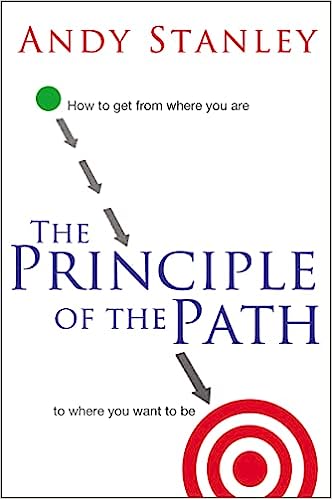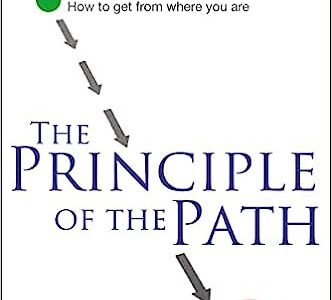These are the quotes I noted while reading The Principle of the Path: How to Get from Where You Are to Where You Want to Be by Andy Stanley:
- What’s true geographically is equally true relationally, financially, physically, and academically… Just as there are physical paths that lead to predictable physical locations, there are other kinds of paths that are equally predictable.
- Perhaps you have heard someone make the argument that experience is the best teacher. That may be true, but that’s only half of the truth. Experience is often a brutal teacher. Experience eats up your most valuable commodity: time. Learning from experience can eat up years. It can steal an entire stage in life. Experience can leave scars, inescapable memories, and regret.
- Direction–not intention–determines our destination.
- Direction–not intentions, hopes, dreams, prayers, beliefs, intellect, or education–determines destination. (It is the way God designed the world to work.)
- You and I will win or lose in life by the paths we choose.
- Generally speaking, we don’t abandon the clearly marked paths because we are looking for trouble. There’s always something about the alternate routes that is powerfully appealing.
- We should break the habit of drawing a circle around individual decisions and events and dismissing them as isolated occurrences. These are steps. Steps that lead somewhere. Because life is connected.
- “The prudent see danger and take refuge, but the simple keep going and suffer for it.” – Proverbs 27:12
- The naïve person lives as though life is disconnected; as if there is no connection between today’s choices and tomorrow’s experiences.
- We’ve all heard that experience is the best teacher. But the truth is, about the only thing most of us learn from experience is what to expect when we repeat the same bad decisions.
- Forgiveness and consequences are two different things. One does not override the other.
- Prudent people know that it’s what you do that makes the difference, not what you see.
- What feels like a sacrifice now will feel like an investment later on.
- The prudent don’t react to what they see in their current situations. They react to what they see on the horizon.
- “Lord, help us to see trouble coming long before it gets here. And give us the wisdom to know what to do and the courage to do it.” – Proverbs 27:12
- Our quest for happiness often trumps our appreciation for and pursuit of what’s true.
- The problem with the happiness quest is that happy today does not necessarily equal happiness tomorrow. Decisions and experiences that fill me with happiness today may very well fill me with regret tomorrow.
- We listen to our hearts, and then we assign our heads the responsibility of building a case to support our hearts’ decisions.
- Maps are useless if you don’t know where you are.
- “The heart is deceitful above all things and beyond cure. Who can understand it?” – Jeremiah 17:9
- Though we are powerless to fix our hearts, we don’t have to be slaves to them.
- “And you shall know the truth, and the truth shall make you free.” – John 8:32
- Your heart should not be your guide. It can’t be trusted.
- Choosing the right path begins with submission, not information.
- “Now, O Lord my God, you have made your servant king in place of my father David. But I am only a little child and do not know how to carry out my duties. Your servant is here among the people you have chosen, a great people, too numerous to count or number. So give your servant a discerning heart to govern and to distinguish between right and wrong.” – 1 Kings 3:7-9
- Every path has a destination. Direction, not intention, determines destination. Divine direction begins with submission. Information is not enough. We need God.
- More often than not, the circumstances we face are saturated with powerful emotions. Those emotions easily turn into misguided passions. In the end, passion clouds the ability to accurately evaluate the circumstances in order to choose the right path.
- One never accomplishes the will of God by breaking the law of God, violating the principles of God, or ignoring the wisdom of God.
- Debt doesn’t lead to happiness. So when we make a happiness purchase that requires debt, we violate a principle. We assume a connection or relationship that doesn’t really exist.
- Taking cues from people who share your season of life is the equivalent of asking for and following the directions of someone who’s never been where you want to go.
- Since we are all taking our cues from someone, somewhere-consciously or unconsciously- we would do well to be a bit more intentional about whom we borrow from.
- Successful people, people who are where you want to be, are willing to acknowledge what they don’t know. And they are not too proud to borrow the maps of people who do know.
- While it is true that some people quit listening once they become successful, that is not how they got there to begin with.
- Successful people aren’t successful because they knew everything they needed to know. They are successful because they were willing to apply the lessons they learned from others.
- Planning to be ab exception is not much of a plan. Planning to be lucky is no plan at all.
- One of the best things you can do is reject the notion that because people expect you to have all the answers, you must therefore pretend that you do.
- Having a position of responsibility does not ensure that you know everything you need to know to handle that responsibility responsibly. Position does not equal ability.
- One of the primary avenues through which God directs us is the counsel of others.
- There is something more important than being right, and that is making the right decision. People who always have to be right will always be limited in their decision-making ability.
- The best counsel in the world is wasted counsel if our minds are already made up.
- Every decision we make that hurts us also hurts the people who love us most. And those who depend on us most will be hurt the most.
- If direction determines destination, we would be wise to take some direction before choosing one.
- No one gets to the place where he no longer needs wise counsel.
- Success, age, wealth, and power do not necessarily translate into wisdom, self-control, or maturity. Besides, success of all types is intoxicating. And intoxicated individuals are not the best decision makers.
- You will never reach your full potential without tapping into the wisdom of others.
- Asking doesn’t mean you lack wisdom, it’s evidence of wisdom. Because successful people know what they don’t know, and they are quick to go to people who do.
- What gets our attention determines our direction and, ultimately, our destination. (Attention determines direction.)
- Life would be better, richer, and more enjoyable if less of your attention had been hijacked from the things you should have been focusing on.
- Decide ahead of time to pay attention to those things that need and deserve your attention.
- We don’t drift in good directions. We discipline and prioritize ourselves there.
- God cares about the direction of your life.
- Sometimes it is the destinations that are out of our reach that create the circumstances God uses to remind us that we are never out of his reach.
- Knowing doesn’t make the difference. Doing does. The decisions you make will determine the direction and the destination of your life. Choose wisely.

